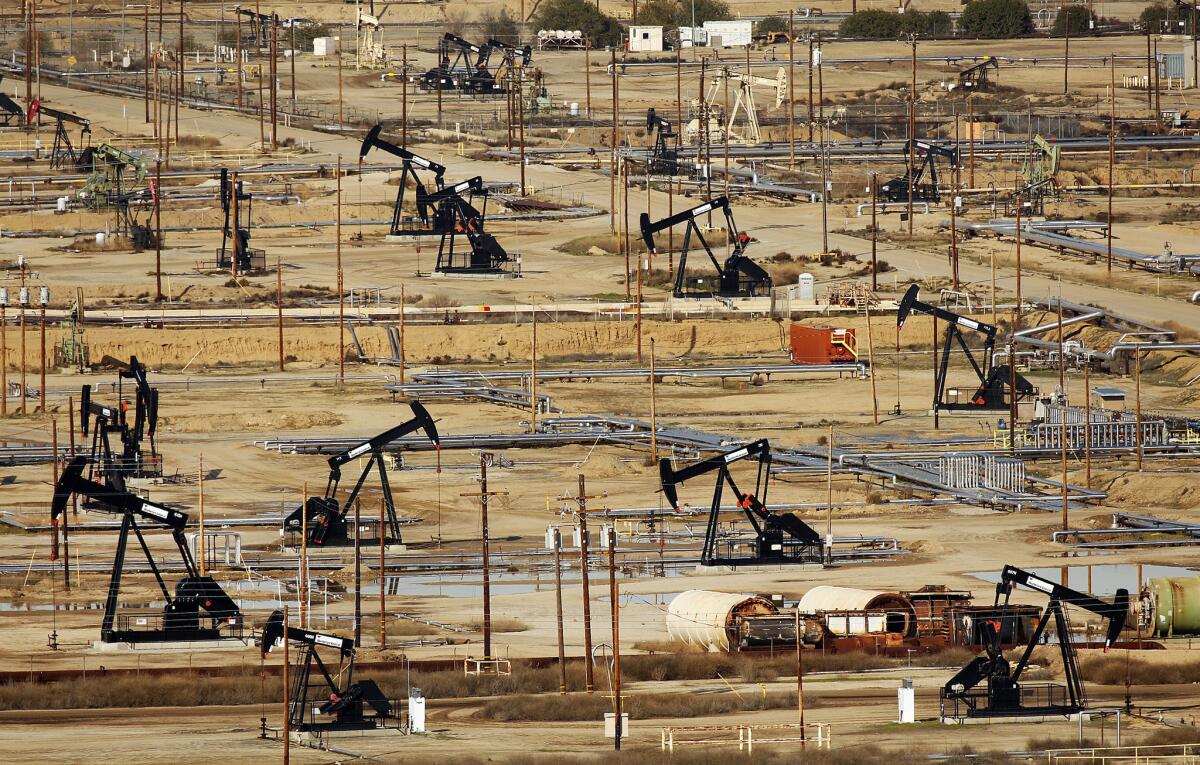Oil’s latest slump takes a heavy toll on Bakersfield

BAKERSFIELD — Most early mornings here, finding an open table at Pappy’s Coffee Shop is a dicey proposition.
The small diner along Rosedale Highway opens at 4:30 a.m., just in time for workers to grab a bite before heading out to the oil fields. But on a recent Tuesday at 6 a.m., many tables sat empty. About an hour later, more customers arrived, mostly oil industry higher-ups, retirees or farmers.
Roger Lake, a regular, scanned the restaurant.
“I don’t see any oil field workers,” he said.
Join the conversation on Facebook >>
Lake knows the industry well. The 76-year-old Bakersfield resident has worked in oil since 1959 and still consults, though the plunging prices encouraged him into semi-retirement.
“All they can do is pull back and wait,” he said. “It could last a year, it could last two years. Who knows?”
Bakersfield is no stranger to the oil industry’s booms and busts. But this time, the slump is different.
Two years ago, the price of oil hit $100 a barrel. Since then, oil producers have pumped more crude than the world needs. Prices started to slide and haven’t stopped, hammered by the recent slowdown of the Chinese economy and a stronger U.S. dollar. Iran’s return to the market can only add to the glut.
On Friday, West Texas Intermediate crude oil — the benchmark for North America — closed at $31.42 a barrel in New York trading. Brent crude, used to price international oil, settled at $34.41 a barrel in London trading.

Oil from Kern County’s wells makes up about 70% of the state’s oil production. Above, a field in Bakersfield.
In a region where the two main industries are oil and agriculture, the worldwide petroleum price collapse feels personal.
At the heart is a surprising fact: Bakersfield and the rest of Kern County produce more oil than any other county in the nation — not someplace in Texas or North Dakota — according to the Kern Economic Development Foundation, a workforce development organization. The oil pumped from the county’s wells make up about 70% of the state’s oil production and 10% of U.S. production.
In 2014, there were about 50,000 energy-related jobs in Kern County, a broad tally that includes services and other businesses beyond drillers, according to the foundation.
By the end of that year, companies had begun to let workers go. Then 2015 brought even more pain.
Nationwide last year, 104,514 oil-related jobs were cut because of the plunging prices, according to Chicago-based consulting firm Challenger, Gray and Christmas Inc. Last month, 17,178 more people were laid off.
Several companies, such as Chevron Corp. and Halliburton Co., which operate in Kern County, have announced widespread layoffs.
In December, 9,700 people held oil and gas drilling and extraction jobs in Bakersfield, an 18.5% drop from a year earlier, state data show.
SIGN UP for the free California Inc. business newsletter >>
Only seven rigs were drilling new wells in California at the end of January, down from 16 a year earlier, according to Houston oil field service company Baker Hughes.
California ranks third in the nation in crude oil production, topped only by Texas and North Dakota, according to the U.S. Energy Information Administration.
Les Clark, executive vice president of the Bakersfield-based Independent Oil Producers’ Agency, has weathered four oil price downturns in his career and said the most recent slump has hit the mom-and-pop operators he represents especially hard. Oil field service companies including equipment suppliers and maintenance firms, along with contractors and consultants, have gotten the worst of it.
“I’m just hoping a lot of my guys will be able to hang on,” Clark said. “This is serious business.”
San Joaquin Bit Service Inc. has laid off 25% of its staff. Oil field service company DMW Industries Inc. is down to 10 field employees from the 85 it had in 2014.
“This happens every five to seven years,” said David Miller, president of DMW Industries. “But this is the worst I’ve ever seen and the longest I’ve ever seen.”

The Petroleum Club on the 12th floor of Bakersfield’s tallest building has seen a drop in its membership.
The downturn seeped into city and county finances.
For the fiscal year ending June 30, 2016, Kern County expects to collect $103 million in taxes from the oil and gas industry, compared with $143 million in the previous fiscal year. The assessed value of all property in Kern County for the fiscal year starting July 2015 was $89.2 billion, a 9% decrease from the year before that was pegged directly to the drop in oil and gas prices, according to the Kern County assessor-recorder’s office.
“As far as revenue for the county, the special districts, schools, groups that depend on the property tax dollar, it’s worse than it was last year,” said Lee Smith, Kern County assistant assessor. “You can see that a lot of the local economy depends on oil. It’s far-reaching and we aren’t really sure where it’s going to end up.”
Sales tax revenue also has declined because companies are cutting back on the equipment they buy.
This has forced the city to make budget adjustments, reduce some planned capital projects and institute a limited hiring freeze, said Assistant City Manager Chris Huot. Revenue from hotel taxes has fallen as fewer oil-industry travelers visit Bakersfield, City Manager Alan Tandy said.
“We’ve seen the cycle before,” he said. “The pacing in which it came was unusual.”

The decor at Pappy’s Coffee Shop is a nod to the area’s oil industry. Bakersfield and the rest of Kern County produce more oil than any other county in the nation.
In Bakersfield, everything is connected to oil. A silver water tower that stands above Bakersfield High School’s campus is emblazoned with “Driller Country,” a reference to the school’s mascot. Pumpjacks teeter-totter behind chain-link fences in parking lots and near parks.
Even Pappy’s decor is a nod to the oil industry. Old-fashioned metal signs for J.P. Oil and Getty Oil Well No. 12 are crammed next to framed photos of oil tankers, derrick towers and pumpjacks. A few taxidermy buffalo and zebra heads break up the homage.
“Everybody feels it,” said Jason Mundorf, San Joaquin Bit sales manager, as he sat in the diner. “We know it will rebound at some point. I try to stay optimistic — things can only get better.”
Even the exclusive Petroleum Club on the 12th floor of Bakersfield’s tallest building has seen a dent in its membership. About three years ago, the private social and business club hit its peak with 1,140 members. Now there are about 850, club President Dave Plivelich said.
The club, which boasts chandeliers, floor-to-ceiling windows and an ornate wood-paneled entryway, has long abandoned its oil industry membership restriction and expanded its ranks to include other professions such as medicine, insurance and marketing.
Beyond the immediate pain, industry insiders are worried about what will happen when the downturn ends and oil companies start ratcheting back up. Talented employees may seek work elsewhere, such as in Texas or Colorado, or quit the industry.
In the meantime, some companies are adjusting their business to try to make money elsewhere. Oil well drilling companies, such as San Joaquin Bit, are frequently turning to water well drilling, a lucrative prospect in the midst of the drought. Field workers who have been laid off are finding jobs in construction or solar panel installation.
“There’s diversity, there has to be,” said Clark of the Independent Oil Producers’ Agency. “You’ve got to keep the people working.”
Chad Hathaway’s father warned him not to go into the oil industry and urged him instead to consider a government career with a steady paycheck. But Hathaway said he always respected his father’s job and the work ethic of the oil workers.
At 39, he is the owner of Hathaway LLC, a Bakersfield oil producer that takes over old wells and reworks them with newer technology, making him the fourth generation of his family to enter the industry.
He’s been forced to lay people off, cut pay and reduce worker hours.
“We’ve got to muscle through this for a year,” Hathaway said. “We’ll do it.”
Twitter: @smasunaga
ALSO
6th Street Bridge finally starts to fall to demolition crews
After San Bernardino terror attack, many are attending active shooter trainings
‘Comfort women’ and a lesson in how history is shaped in California textbooks
More to Read
Inside the business of entertainment
The Wide Shot brings you news, analysis and insights on everything from streaming wars to production — and what it all means for the future.
You may occasionally receive promotional content from the Los Angeles Times.











